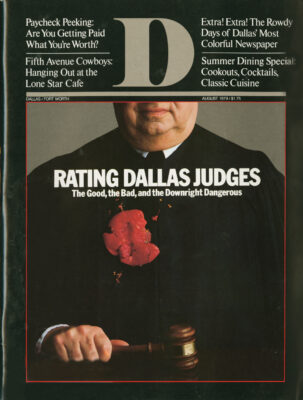Once when I was five or six I woke up suddenly in the dark, conscious of someone by my bed. A big shape paused, touched the covers, turned to my little brother’s crib. “Mother?” I said, startled, but the shape was gone. The next day I told my mother I’d seen Santa Claus.
“You what?” she said, laughing when I insisted. “Honey, that wasn’t Santa Claus – that was your daddy. He always gets up in the night to see about you.”
My daddy, I marveled. I looked at him closely when he came home from work that night, but he greeted me gruffly as usual, “How are you, Worry Wart?” He never said, I love you, but now I knew. When the rain blew in he pulled down the window; when the temperature dropped he tucked in the blanket. He walked the nights of my childhood in his undershirt and baggy drawers, guarding his lair, his cubs, and taught me the first thing I knew about men.
Now I recognize and respect the same impulse in John Leonard. Reading his recent book, Private Lives in the Imperial City, I was drawn by his anxious fatherhood into a recollection and revaluation of my own father. Private Lives, dedicated to Leonard’s son Andrew, his daughter Amy, and his step-daughter Jennifer, “who came later,” is in part Leonard’s record of pulling down the windows and pulling up the blankets. The hostile elements are different – divorce, separation, remarriage – but no less hostile, and Leonard faces them with the same conviction and constancy my father had regarding rain and cold. “A son shouldn’t go to the movies while his father is being married,” he says. “Perhaps you think the children would prefer to be elsewhere on the appointed Saturday. Don’t let them be anywhere else . . . They are important witnesses. It isn’t necessary that they altogether understand you; it is necessary that they take you seriously.”
Private Lives consists of 69 of Leonard’s pieces which appeared after 1976 in the New York Times. The Dallas Morning News picked up a few of these columns and ran them in its “Trend” section, among the fashion ads and hemline discussions – an odd place to stow a writer who wears only blue jeans and denim shirts, with a “turtleneck for blizzards” and “corduroy for formal occasions.” I suspect the News thought he wasn’t serious enough for an editorial slot next to the big boys who write about Arabian oil and price control. All Leonard writes about is birth, death, sex, love, history, religion, baseball, and poetry. And children. It isn’t easy to be a father.
It may be twice as hard because, like many fathers now, John Leonard has part-time status. He and his children’s mother – his “penultimate wife” – are divorced; Andrew and Amy live half the year in Florida with her, half in Manhattan with him, his ultimate wife, and his step-daughter. It’s all very civilized and contemporary, but he spends “more time in airports than in bathrooms.” Called to Florida for five days of babysitting, he looks around at familiar objects in the bent perspective of the new house the African figurines on astrange windowsill, the piano”against the wrong wall,” thechildren in the order, peace,and purpose of their new lives and rues his own displacement: “The father of thesechildren . . . sleeps in theguest room of the new housewith an open suitcase.”
As the father in this divided family, he has also inherited “the pork chop problem” on occasion: “not the problem of who, on being told to do so, buys the pork chops … or even who cooks them. It is the problem of who conceives of pork chops … as a problem,” who assumes full nutritional responsibility. “In our brave new world, the pork chop problem was his” – just as the birthday party problem and the fondue fork problem and vacuum cleaner bags problem belong to him, “who imagines the necessity of vacuum cleaner bags.”
I doubt if my father has ever seen a vacuum cleaner bag up close, and I’m sure he has never cooked a pork chop, or anything, in his life. I’ve never seen him at the stove. My mother presided in the kitchen; he provided the bacon, but he didn’t cook it. Oh, he was always there with us to eat it; we were his full-time fate, the inescapable and I suppose indispensable air he breathed. As Will Rogers said about being born, “It was a custom in those days; they didn’t know any better.” We didn’t know any better, and neither did he. But he didn’t have the pork chop problem.
He had others. He could talk for hours, tell story after story about old Wash Simms plowing in August in his gum raincoat or the revival in the nigger church at Mt. Pleasant or what Miss Ola Wooten said to the sewing machine salesman. He loved an audience. But alone with me, his only daughter, he was so shy he was almost mute, a shyness he hid behind joviality – popping me with a dish towel, pinching the back of my neck till I squealed, teasing me at Sunday dinner about Billy Patterson or Johnny Ligon, bragging about me so that when I started into a room and heard him say my name in conversation I would slip out again, embarrassed.
He did embarrass me. When I was in college in Jackson, I tried to talk to him about civil rights. “Don’t say nigger,” I said impatiently, wincing during one of his stories. “And don’t generalize from the past. It’s a different time now. The country’s changing.”
It’s the only time I ever remember his being really mad at me. “You’re an educated fool,” he said, his jaw setting stubbornly. “Some things never change.”
I didn’t say any more then, but my jaw is as stubborn as his and it made a split between us. I embarrassed him too, for years. When James Meredith marched southward through the state, my reporter husband covered the march for a Northern paper and I tagged along. My father didn’t like seeing his little girl walking the highways with agitators and riff-raff. I can understand why now. He had grown up on a pleasant, prosperous farm, in a large family known all over his county; he felt he belonged in a place, a life, and a hierarchy that were vanishing. We didn’t yell or make scenes, but we were ashamed of each other, I to have a father who said nigger and meant it, he to have a daughter ! who had forsaken the old ways and joined the hostile forces.
The pity is that he didn’t have John Leonard’s powers to persuade. At one point in Private Lives, Leonard’s fourteen-year-old son proclaims his atheism: “He has decided not to buy the idea of a supernatural first cause or prime mover. Life, he thinks, probably got started by a lightning bolt or a blast of cosmic radiation.” Leonard, calling himself Dmitri to equivocate the personal, feels shocked, sad, above all guilty. “He has neglected to talk to his son of final things. They talk of haircuts, homework, TV programs, sports scores, eating habits.” He plans to make amends:
If Dmitri knew how, he would say to his son that, granted, religion is wishful thinking, but there is no other kind of thinking, and it seeks ceremony. Just as there are tools that we trust, that are true, so too there are symbols that are sacred, in which our hopes repose, true, too, and enduring. Look, he would say, at the shadow in European painting, or at cathedral light. Listen to Bach, or to Handel’s Messiah. They aren’t arguments . . .They do, though, bear witness to an unarguable need, a passion. We wonder.
How does one begin such a conversation with one’s son?
For John Leonard, trained in argument and skilled with words, a way could be found. For my poor awkward father, dismayed at his loss, the problem was harder. If only he’d tried Leonard’s tack, said, Granted, the South is full of injustice, but there is beauty in it too. Look, he should have said, at the families, sometimes three generations in one house, and every dotty old maid aunt and incontinent grandfather cared for by kin; look at the code of hospitality that sends a stranger at church home for Sunday dinner with a deacon; look at the rich wry humor of disaster, at the poetry of a region that preserves its language and history in talk. I know now, as I’ve watched my father through the years, that those are the things he loves. But what he talked about to me, a rebellious girl, were uppity niggers and outside agitators, as if he were to defend God by pointing out the need for Inquisition. Of course, it didn’t work.
My father wanted to hold me to a South that to him meant decency, piety, and purity, to keep me safe from rambling men, hangovers on Sunday morning, and a bad reputation with my aunts. John Leonard wants to save his children from “plastic,” a catchall term with which he labels all that gets between them and the direct experience of life. He denounces, among other things, the credit card that “stole all the sex from money,” the plastic pinball machine “disguised as a Christmas present,” the “nonwoven cellulose disposable diapers, the Thermoglass container . . . and the synthetic nipple,” “the Orion acrylic sleeper with the skid-resistant plastic soles” of his children’s babyhood. He wants them to be able “to smell … to remember, to be sincere or edible, to grow or experience motion, to have grain or be tickled, to reflect or sustain rainbows” – in short, to know the organic world of feeling.
His children love him but they don’t understand him. “Organic father,” they say in their patient forbearance, “you must be hungry.” And they bring him “a Spam sandwich on Less Bread, with a side of Pringles and a Diet Pepsi.” Children of the Plastic Age, residents of a “submarine” of a house in Florida, they are as happy with their Snoopy telephones and Naugahyde bean bag chairs as I was marching down Highway 78 with my friends the agitators and riff-raff.
The truth is that we must all betray our fathers to be ourselves. Born into a different decade, a different world, what can I have in common with this man? A name, high cheekbones, Grandmother Reid’s eyes, a tendency to depressions – surely none of these is the indissoluble me. And I look at my cheerful children, who can swing tennis rackets, ride Mopeds, do the Bump. Do they deserve a mother who hunched over books, flunked swimming, learned to drive at 21?
They don’t deserve me but they got me, just as I got my father. Once when I was a college freshman, I got a ride home for the weekend from Jane Hutson, a senior who lived in a town about 25 miles from mine. Jane had her own car, wore Toreador pants before anyone else did, and smoked behind wet towels in the dorm. When we arrived at her house it was already about 6:30 on Friday evening; she had a date at 7, and her parents were due at the country club. I called my father to pick me up and sat down to wait. For two and a half hours Jane, her date, and her parents sat waiting with me: Jane couldn’t leave because I was her guest, her date couldn’t leave without Jane, her parents couldn’t leave them alone together in the house in case I left, and I couldn’t leave because my father didn’t come.
At last, he drove up in the old black pickup, in shirt sleeves and a cap pushed to the back of his head. Tears of humiliation and anger sprang into my eyes at the sight of him. Where had he been?
He didn’t notice the tears. Pleased with himself, he expanded to all of us. He didn’t exactly know the address, but he knew Jane’s car and the general direction. He thought he’d just drive around till he came to the right house, and by golly he’d found it. He beamed at us all with innocent, stubborn pride.
I have never hated anyone as much as I did my father at that moment, nor loved anyone more than I love him now, remembering. I can see him in his dusty khakis, one foot on the fender of the old truck, nodding in his courtly way to Jane’s manicured mama as he squeezed my neck, while I silently prayed he wouldn’t call me Worry Wart. I didn’t altogether understand him, but I certainly took him seriously.
There are always these differences, I guess. With Leonard and his son it’s the Romans vs. the Greeks. His son loves Latin and Leonard, a Graecophile, reminds him that the Greeks built temples and the Romans built sewers. It’s hard for us to give our parents, and our children, what they want.
Once Leonard’s ten-year-old daughter asks him what he wants for Christmas. He replies, in the crazy way of fathers:
What do I want for Christmas? I want you to listen to Beethoven’s last quartets instead of the Grateful Dead. I want Bobby Kennedy to be alive. 1 want to be Russell Baker or Leo Tolstoy, whichever comes first. I want to go to Mars. I want to be your father.
She probably gave him a tie from Bloom-ingdale’s.
I’m not exactly ten any more, and I know better than to allow my father an open shot like that. Even if I knew what he wanted for Christmas, I probably couldn’t cough it up. After all, I’m not Santa Claus. I’m just his daughter.
Related Articles

D CEO Award Programs
Deadline Extended: D CEO’s Nonprofit and Corporate Citizenship Awards 2024
Categories include Outstanding Innovation, Social Enterprise, Volunteer of the Year, Nonprofit Team of the Year, Corporate Leadership Excellence, and more. Get your nominations in by April 19.
By D CEO Staff

Local News
Texas Lawmakers Look to Take Zoning Changes Out of Dallas’ Hands
Dallas is taking resident input on its ForwardDallas land use plan, and a vocal group is leading the opposition. But new talk among conservative Texas policy makers indicates the decision might not be in the city's hands for long.

Healthcare
Convicted Dallas Anesthesiologist Could Face 190 Years for “Toxic Cocktails” in IV Bags
Dr. Raynaldo Ortiz worked at the Baylor Scott & White Health facility after spending time in jail for shooting a dog and while having a suspended medical license.
By Will Maddox


